Table of Contents
Are you intrigued by the convergence of real estate and technology?
Have you ever wondered how those sleek, user-friendly real estate apps come into existence?
In this blog, we’ll take you on a journey through the realm of real estate app development, providing you with a deep understanding of the concept, its benefits, the development process, and much more.
Whether you’re a curious beginner or an industry veteran, this blog will equip you with the knowledge you need to navigate the exciting world of real estate app development.
Therefore, with this being said, let’s get right into it:
Understanding Real Estate App Development
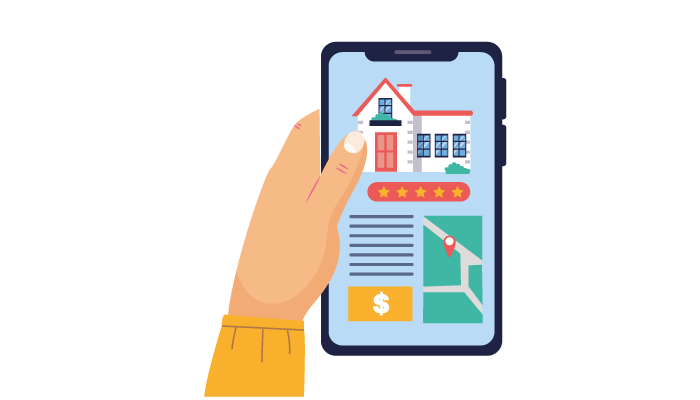
In a world where technology is transforming industries, real estate app development stands at the intersection of innovation and convenience.
This branch of software development involves creating applications tailored to the needs of property buyers, sellers, agents, and investors.
Moreover, these apps essentially act as digital marketplaces, streamlining various real estate processes and enriching the user experience.
From browsing property listings to embarking on virtual property tours, these apps offer a plethora of functionalities that redefine how we engage with real estate.
In essence, real estate apps are product of mobile app development. But even so, they can be divided into different types as we shall discuss in the section below:
Types of Real Estate Apps
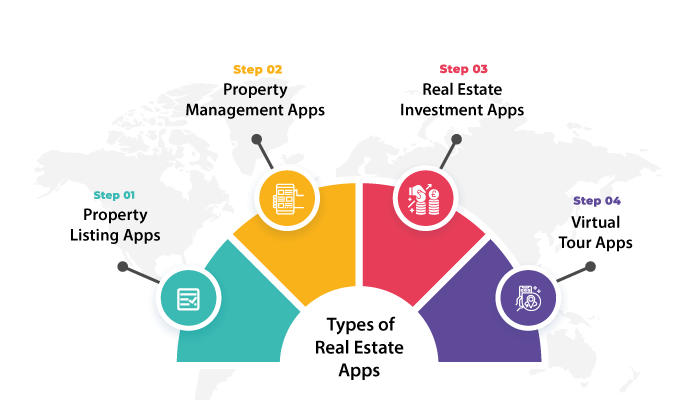
Diving deeper, let’s explore the diverse landscape of real estate apps.
These apps cater to a range of user needs, and understanding their types can provide a comprehensive view of the app development landscape.
These are, as mentioned below:
1. Property Listing Apps
Imagine having an entire catalog of available properties right at your fingertips.
Not to mention, property listing apps offer this convenience, allowing users to refine their search based on factors like location, price, and property type.
These apps revolutionize the property search process by offering a seamless browsing experience.
2. Property Management Apps
For landlords and property managers, handling multiple properties and tenants can be a logistical challenge. Enter property management apps.
These tools simplify tasks such as rent tracking, maintenance requests, and tenant communication. By centralizing property management operations, these apps elevate the ease of property ownership.
3. Real Estate Investment Apps
Investors seeking opportunities in the real estate market rely on these apps for valuable insights.
Plus, real estate investment apps offer data-driven analyses of market trends, potential return on investment (ROI) calculations, and investment avenues.
Furthermore, these apps empower investors to make informed decisions and strategize their investments effectively.
4. Virtual Tour Apps
The concept of physically visiting properties for evaluation is evolving.
In addition to this, Virtual tour apps leverage technology to provide immersive 3D experiences.
Users can virtually explore properties, gaining a realistic feel of the space—saving time and energy in the property discovery process.
Advantages of Real Estate App Development

The fusion of real estate and technology brings forth a multitude of advantages, both for users and businesses in the industry.
Let’s delve into these benefits to understand the significant impact of real estate app development.
– Enhanced User Experience
Real estate apps introduce a convenient and efficient way for users to explore properties and interact with agents.
Plus, the ability to access property information, schedule viewings, and communicate seamlessly through a single platform enhances the overall experience for users.
– Wider Reach
The limitations of geographical boundaries are dismantled by well-developed real estate apps.
With these apps, property listings can reach a global audience, expanding opportunities for real estate businesses and potentially breaking down traditional location barriers.
– Automation
Automation proves to be a game-changer in the real estate industry.
Tedious tasks like scheduling property visits, sending notifications, and sharing documents can be automated, leading to increased operational efficiency and smoother transactions.
– Data Analytics
The beauty of apps lies in their ability to gather valuable user data.
Real estate apps collect insights into user preferences and behaviors, allowing businesses to analyze this data and refine marketing strategies, thus staying ahead of market trends.
These are some of the benefit that comes with this proptech solution. And with this being said, let’s move on and look at the reasons to invest in real estate app development.
Reasons to Invest in Real Estate App Development
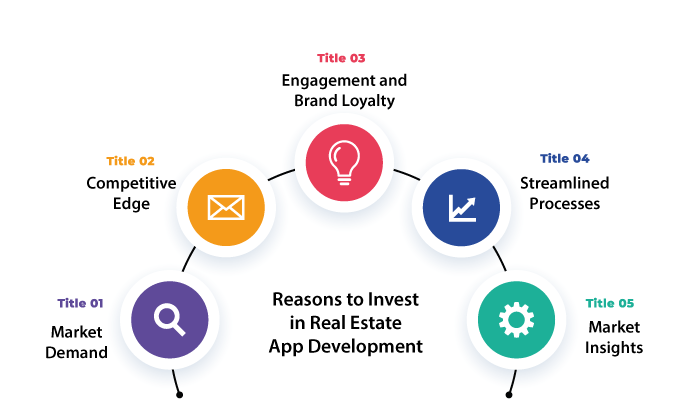
Why find app developers and create real estate app of your own?
As the world becomes increasingly digital, embracing real estate app development offers several compelling reasons that can significantly impact your business strategy.
1. Market Demand
In the digital era, users expect convenience at their fingertips.
Real estate apps satisfy this demand by providing access to property information anytime, anywhere.
Developing a real estate app positions your business as responsive to market needs.
2. Competitive Edge
The real estate market is fierce.
A well-designed app can set your business apart, showcasing your commitment to innovation and efficiency.
This differentiation can give you an edge over competitors.
3. Engagement and Brand Loyalty
Real estate apps provide a direct channel of communication with users.
By engaging users through personalized notifications, property recommendations, and valuable content, you can foster a strong sense of connection and loyalty to your brand.
4. Streamlined Processes
Real estate transactions involve multiple parties and paperwork.
An app streamlines these processes, making it easier to manage documents, appointments, and negotiations in one place.
5. Market Insights
Real estate apps can provide valuable insights into property market trends, helping users make informed decisions based on data-driven analyses and predictions.
Key Features of Real Estate Apps

Real estate apps boast a range of features that contribute to their user-friendly and practical nature.
Let’s explore some of these key features that define the user experience, thus should be considered for real estate app development.
These are, as mentioned below:
1. Advanced Search Filters
Picture being able to narrow down your property preferences with ease—choosing from filters like price range, location, property type, and amenities.
Real estate apps provide these advanced search filters, empowering users to find properties that align precisely with their desires.
2. Virtual Tours
Imagine exploring properties through immersive 3D virtual tours.
With this feature, users can virtually “walk through” properties, inspecting details, layout, and ambiance—all from their device, saving time and energy.
3. Favorites and Alerts
In the vast sea of property options, users often come across multiple properties of interest.
Real estate apps allow users to save their favorite properties for future reference.
Moreover, users can set up alerts to receive notifications about new listings and price changes.
4. Secure Document Management
Real estate transactions involve a significant amount of documentation.
Real estate apps facilitate secure document uploads, electronic signatures, and contract management, ensuring seamless and secure transactions.
5. Geolocation Integration
Integrating geolocation features helps users explore properties within a specific radius, discover nearby amenities, and gauge neighborhood vibes, all contributing to a comprehensive property search experience.
6. Mortgage Calculators
Including mortgage calculators helps users estimate their monthly payments based on property price, down payment, interest rate, and loan term, providing financial clarity in the decision-making process.
7. Interactive Maps
Interactive maps offer an intuitive way for users to visualize property locations, nearby schools, public transportation, and other points of interest.
8. User Profiles
Allowing users to create profiles helps personalize their experience.
Plus, they can save preferences, track property history, and manage communication with agents.
9. Chat and Notifications
In-app chat functionality enables direct communication between users and agents.
Push notifications keep users informed about property updates, appointments, and important milestones.
10. Social Media Integration
Enabling users to share properties they like on social media platforms extends the app’s reach and potentially attracts a wider audience.
The Real Estate App Development Process
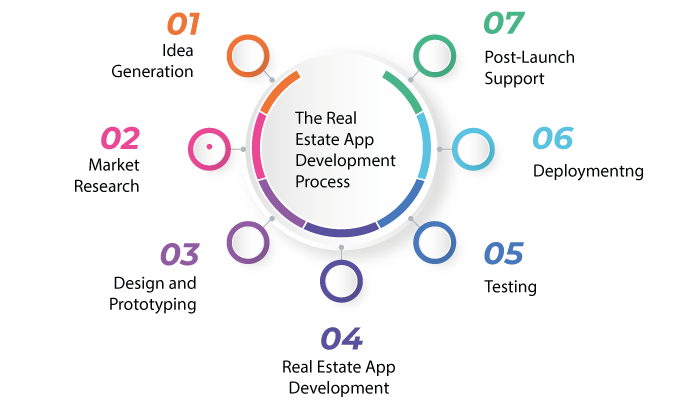
It’s time to learn real estate app development!
Developing a real estate app is an intricate journey that involves various stages.
Understanding this process can help you embark on your app development journey with confidence.
Therefore, let’s get right into it:
1. Idea Generation
Every successful app begins with a clear idea. Define the purpose of your app, identify your target audience, and outline the core features you want to include.
2. Market Research
Understanding the competitive landscape and market trends is crucial. Research existing real estate apps, analyze their strengths and weaknesses, and identify gaps that your app can fill.
3. Design and Prototyping
Before diving into development, create wireframes and prototypes. These visual representations help you map out the app’s layout, user interface, and user flow.
4. Real Estate App Development
This is where the technical magic happens. App developers write code, build the app’s frontend and backend, and integrate any necessary APIs (Application Programming Interfaces).
5. Testing
Thorough app testing is essential to ensure that your app functions flawlessly. Test for functionality, usability, performance, security, and compatibility across various devices.
6. Deployment
Once testing is complete, it’s time to launch your app. Publish it on app stores (like the Apple App Store and Google Play Store) and ensure a smooth rollout to users.
7. Post-Launch Support
The journey doesn’t end with the app launch. Continuously monitor user feedback, fix any bugs or issues that arise, and incorporate user suggestions to enhance the app’s features and usability.
Real Estate App Development Costs
Like any significant investment, real estate app development comes with associated costs. So, how much does it cost to develop a mobile app like this?
However, these costs can vary significantly based on various factors.
A basic real estate app with essential features might cost around $30,000.
But then again, if you’re aiming to develop a more feature-rich app with advanced functionalities, customizations, and integrations, the cost can range from $50,000 to $150,000 or even higher.
It’s essential to define your app’s scope and features clearly to get an accurate estimate from developers.
Best Practices for Real Estate App Development
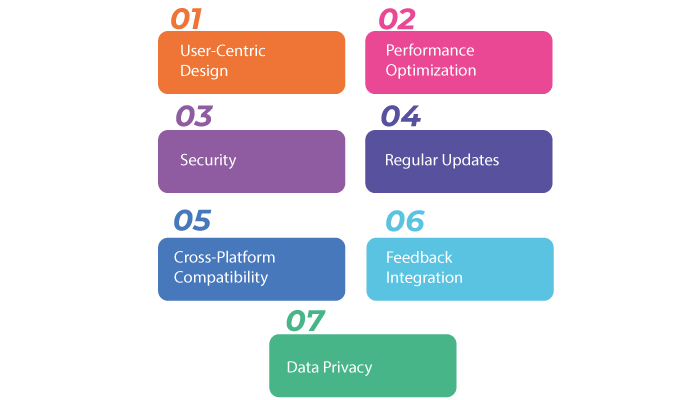
Successful real estate app development requires a strategic approach and adherence to best practices. Here are some crucial considerations to keep in mind:
1. User-Centric Design
Prioritize user experience throughout the app’s development. Intuitive navigation, clear layout, and easy-to-use features contribute to a positive user experience.
2. Performance Optimization
Users expect apps to load quickly and function smoothly. Performance optimization ensures that your app delivers a seamless experience, minimizing loading times and preventing crashes.
3. Security
Security is paramount in real estate apps, as they handle sensitive user data and financial transactions. Implement robust security measures such as data encryption, secure authentication, and secure payment gateways.
4. Regular Updates
Technology evolves rapidly, and user expectations change over time. Regularly update your app to introduce new features, fix bugs, enhance security, and stay ahead of the competition.
5. Cross-Platform Compatibility
Ensure your app works seamlessly across different devices and operating systems to reach a broader audience.
6. Feedback Integration
Create avenues for users to provide feedback. User suggestions can lead to valuable improvements and enhancements in your app.
7. Data Privacy
Clearly communicate your app’s data usage policies and obtain user consent for data collection and processing.
Conclusion
Real estate app development holds the key to innovation, convenience, and transformative experiences in the real estate industry. By harnessing the power of technology, you have the opportunity to create a dynamic platform that not only serves your users but also propels your brand into the digital forefront of the industry. Whether you’re a developer, a real estate agent, or an entrepreneur, now is the time to embark on this exciting journey of real estate app development. There are several mobile app development companies in USA, who can help you with it.
FAQ
Convenience. Buyers can explore multiple properties, take virtual tours, and connect with agents—all from the comfort of their devices.
Real estate apps streamline communication with clients, organize property details, and provide a platform for wider exposure.
Yes, if developed with proper security measures like encryption and secure payment gateways.
Absolutely! Chatbots can handle user inquiries, provide property information, and even schedule appointments.
Geolocation can help users find nearby properties, neighborhoods, and amenities, enhancing the property search experience.
Yes, using frameworks like React Native or Flutter, you can create apps compatible with both iOS and Android devices.
Maintenance costs can range from 15% to 20% of the initial development cost annually, covering updates, bug fixes, and server expenses.
You can monetize through premium listings, featured properties, in-app advertisements, or by offering subscription-based services.
No, real estate apps can also cater to commercial properties, vacation rentals, and land listings.
The future holds AI-driven features like personalized property recommendations, enhanced virtual reality experiences, and predictive analytics for market trends.





No Comments
Comments are closed.